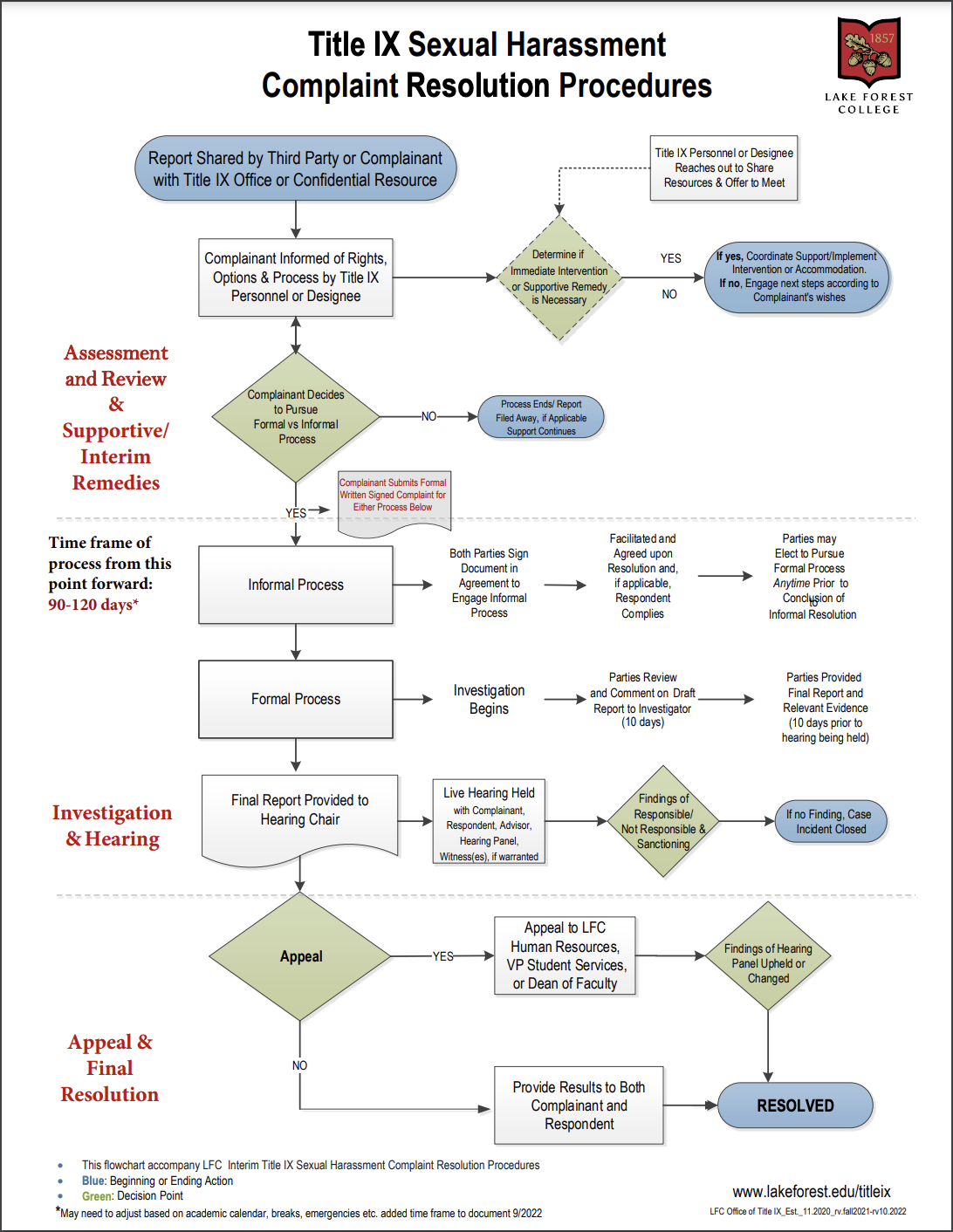Rights and Resolution Chart for Parties

This is the Title IX resolution process for complaints regarding sexual misconduct. A simplified flowchart with the formal and informal processes:

Both the respondent and complainant have rights under the College's Title IX policy regarding sexual misconduct. To learn more about your rights: as a complainant visit our Rights of Complainant page; as a respondent visit our Rights of Respondent page to learn more.
-
Amnesty: A student who reports sexual misconduct, either as a complainant or third party witness, will not be subject to disciplinary action by the College for their own personal consumption of alcohol or drugs at or near the time of the incident, provided that they did not place the health or safety of any other person at risk.
-
Complainant: Individual who is reported to have experienced prohibited conduct, regardless of whether the individual makes a report or seeks disciplinary action.
-
Confidentiality: Information related to a report of sexual misconduct will be shared only with those who need to know in order to assist in the resolution of the matter. Reporting students may request confidentiality or that their report not go through a formal resolution process, although this can affect the ability of the college to respond to the complaints. Generally, the Title IX Coordinator will be able to honor such requests, based on certain considerations such as: whether a threat to the community exists based on the use of weapons, violence, pattern, or other threatening conduct by the accused; the respective ages of the complainant and the respondent; the right of the respondent to receive notice before disciplinary action is taken.
-
Respondent: Individual who has been accused of prohibited conduct.
-
Retaliation: Retaliation against an individual for reporting sexual misconduct, engaging in protected activity, or participating in the complaint resolution process, is prohibited. Retaliation includes but is not limited to, intimidation, threats, or discrimination towards an individual with the purpose of interfering with the rights or privileges received in the process of reporting a complaint or prohibited conduct. Any retaliation concerns should be reported to the Title IX Coordinator.
-
Third-party: Individual who is not a University student, faculty member, or staff member (e.g., vendors, alumni/ae, or visitors).
-
Witness: Individuals who may have information relevant to a report of prohibited conduct, as a result of being present in, or holding factual information of the moment of the allegation. A witness may be a student, an employee, or a third party.
Steps to Resolution of a Complaint
***Please be aware that the College's resolution process differs from the U.S. criminal justice process. To read more about the differences between criminal prosecution and Title IX adjudication visit this helpful PDF.
- Preliminary Inquiry: The Title IX Coordinator will assess the nature of the sexual misconduct report, the safety of the involved individuals and of the campus community, the Complainant’s preference for resolution and/or request for confidentiality, and the necessity for any protective measures to maintain the safety of the Complainant or the community.
- Informal Resolution: Where appropriate, the Title IX Coordinator will informally resolve complaints by taking action to stop the behavior, address its effects, and prevent recurrence without a formal investigation.
- Formal Investigation: When a complaint cannot be resolved through the informal resolution process, the College will conduct a prompt, thorough and impartial investigation. Investigations are typically conducted by the Title IX Coordinator or designee and consist of interviews with the Complainant, Respondent, and other identified witnesses and gathering of other relevant evidence. All parties may have a support person of their choosing present throughout the proceedings.
- Final Determination: The College will make a good faith effort to resolve all sexual misconduct reports as expeditiously as possible. Most matters are resolved within 60 days. The investigator shall determine whether it is more likely than not (i.e., by a preponderance of the evidence) that sexual misconduct occurred. All parties will be notified, simultaneously and in writing, of the investigator’s determination and their right to appeal. If the investigator determines that misconduct has occurred, the report will be forwarded to the appropriate College official for determination of sanctions.
- Sanctions: Sanctions for sexual misconduct offenses may include: verbal or written warning, mandatory educational programming, community service, probation, removal from housing or other campus programs or positions, prohibition from buildings or areas of campus, suspension from school or employment, and separation from the College.
- Appeals: Either party may appeal the final determination and/or the sanctions to the Sexual Misconduct Appellate Board, whose decision is final.
Both the respondent and complainant have rights under the College's Title IX policy regarding sexual misconduct. To learn more about your rights: as a complainant visit our 'Rights of Complainant' page; as a respondent visit our 'Rights of Respondent' page to learn more.
Title IX
Contact Information
LaShun McGhee, CAAP
Title IX Coordinator
847-735-6009
lmcghee@lakeforest.edu

